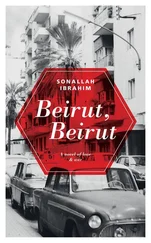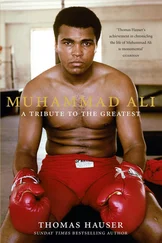I didn’t dare approach the ambulance and I didn’t even have a desire to accompany them. In reality, I couldn’t. All I could do was run — run or fly — toward the port with Harut’s voice ringing in my ears as though it were coming from another world: “Where are you going? You have to come with me to the hospital, they may be alive... Come back... come back...”
But I kept running like someone penetrating an endless, closed in, red-hot fog. I couldn’t feel any part of my body. I became an errant, gelatinous mass of that angry air that Beirut breathed. I was a screaming voice, weighed down by pain I couldn’t bear. How could Harut dare to call me to come back?
Did he not see the lock of incandescent fire from Tamara’s red hair silently fading into the blood flowing from Zeina’s sliced open cheek? Is it conceivable that I alone saw her translucent shoulders, like my passionate desire for her, embracing like two stems of broken lilies, pinned down like a murdered dove among the bodies of my family and the others?
I saw her hair, I saw her shoulders, and I saw my life extinguished at that moment. Her red hair, which for so long had excited my passion, my dreams, and my hopes, was a volcano. Here it is now — like everything else — smoldering in front of me, and sleeping...
Come back? Come back to whom?
On the tenth day of the tenth month that year, a little bit before midnight, I stole onto that unknown ship, which was carrying boxes of red apples. The ship was ready to leave from the port of Beirut. I never came back.
Originally written in Arabic.
Corniche/Ashrafieh
It is a contested fact that wheat is behind the current global obesity epidemic. Many new studies claim that newly genetically modified wheat is the decisive factor in, among other mental and physical complications, weight gain. Let us take, as a specimen, the Lebanese population and thoroughly scrutinize the subject, so that we might deduce whether wheat and its derivatives are, in fact, a grand contributor to the obesity of this small nation. We observe that obesity is most visible in the rulers, politicians, and, certainly, the clerical class.
The use of utensils at the Lebanese table is not essential. The fork and the spoon were originally absent, introduced only during French rule of the region. But there was no need for them at all because the Lebanese had found a way to use their thin bread as both a grabbing device and a scooping utensil. This practice, one must admit, is an ingenious way of preserving both autonomous and hygienic practice in a cuisine that encourages sharing and the communal consumption of food. Each person rips off a small piece of bread and uses it to handle the food and consume it. He or she will go on to take a new, freshly ripped piece of bread to scoop or grab again. In this manner, every bit of food is consumed, and every consumption uses a new and clean utensil.
There are exceptions, of course, such as when eating birds, which one eats with bare hands and without the use of bread. For such occasions, a word was invented, nesh , which means eating without bread.
Lebanon’s renowned cuisine could well be one of the most diverse and healthy in the world. Well, without the wheat factor, of course. Wheat, or more precisely bread, is the country’s misdemeanor, perhaps even its underappreciated tragedy, along with its unbearable rulers, noise, corruption, the constant threat of war, and its mad traffic.
Lebanese have a great affinity for the taste of birds. Birds are killed indiscriminately, hunted and plucked, opened and emptied of their entrails, and then grilled and served with pieces of lemon and a lot of salt. Small birds are often devoured with their bones. One takes a special pride in the cracking of a bone in one’s mouth.
Before the devastating effects of the pesticide DDT, widely used and still in use in what little agricultural space is left in this small country, birds were found in abundance in Lebanon and Syria. However, hunters, much like birds, disregarded borders in the pursuit of killing. Between the devastating effect of chemicals and the hunt, the bird population was almost wiped out.
A cry of alarm went up from some environmental organizations and, ironically, from eager hunters — who in the absence of birds began turning their guns into imaginary flying goats — and the Lebanese government banned hunting in 1995.
The law was effective for a while; there was a small recovery and a comeback by the birds, but the politicians eventually turned a blind eye to their plight, the warlords found the law a bit amusing, and the clergy never challenged the beliefs that the earth belongs to man, nature is at the servitude of men, and God created the birds to be disposed of by man, etc.
Finally, in the absence of birds, the Lebanese went back to consuming the remaining varieties of food, their fingers tearing and waving many little pieces of bread.
The result of these habits was the nation’s expansion — individual expansion, that is. A nation of round, fat midgets was seen squeezing themselves into their little old French-made cars, vehicles they had so dearly cherished through the decades. But their wheat bellies and humongous asses could no longer fit. One day, a merchant’s wife was stuck in her own car for hours. Another day, a politician’s car had to be dismantled in order to pull him out. The merchant husband decided to try to introduce bigger vehicles to this bread- and car-loving nation. Four-wheel drive, wider and more numerous seats, higher wheels and larger trunks, cars massive enough to fit a fresh kill, no matter how large or small its size. A special feature allowed the trunk to be transformed, metamorphosing into a small seat for the foreign maid who, mysteriously enough, never gained weight, always retaining her diminutive size, thereby fitting into the small seat and accompanying the family on their voyages.
One must mention here that, upon further study, it was observed that these maids stayed thin and fit because they stuck to their original diet of rice, vegetables, and spices.
Soon the country was filled with large cars. The popularity of these spacious cars triggered an existential crisis for politicians and warlords alike, for it had always been customary for this important strata of society to own the largest cars. Size, here as in many other places of the world, signaled importance and status. But with this democratization, largeness could no longer effectively distinguish the rulers from the common. The car merchants came upon an ingenious solution. Glass-tinted windows! Black glass that allowed the vehicle’s occupants to see out while remaining veiled and unrecognizable inside. Within a matter of months, the entire ruling class had acquired tinted windows. A convoy of five large cars with darkened windows inspired reverence and indicated importance, if not danger.
This flock of cars was to be avoided at any cost. If one happened to get in the way, the risk of getting shot was elevated. The best thing to do was move out of the way and let the power machines pass.
With time, the tinted windows expanded beyond the class of politicians and warlords. Cars belonging to the family members of politicians were, by default, outfitted with tinted windows. The concubines and mistresses of warlords found it very convenient to pass, incognito, through residential neighborhoods. Later on, the favorite singers of warlords, as well as ministers’ acquaintances and business partners, were also granted permission to acquire these dark shades.
Slowly, the license for invisibility was so widespread as to become banalized. The whole city drove veiled in glass and metal. People were no longer able to assess wealth, honor, and danger. All of a sudden, the city felt equal and the people lost their sense of self-worth. Invisibility had a devastating effect on suit merchants, hair gel suppliers, and the purveyors of haute couture, lipstick, and high-heeled shoes.
Читать дальше












